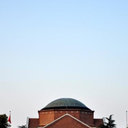Transitional cell carcinoma associated with aristolochic acid nephropathy: most common cancer in chronic hemodialysis patients in China.
Märksõnad
Abstraktne
BACKGROUND
The research of cancer in patients on hemodialysis (HD) in China has not been reported. The aim of this study was to investigate the clinical and histological features and outcomes of cancer in Chinese HD patients.
METHODS
The study subjects were 49 cancer patients (1.4%) out of 3448 end stage renal disease (ESRD) patients maintained on HD at China-Japan Friendship Hospital from October 1997 to July 2011.
RESULTS
Urinary tract cancer (74%) was the most common followed by gastrointestinal tract cancer (12%), breast cancer (6%), lung cancer (4%), thyroid cancer (2%), and hematologic cancer (2%). Thirty-three patients (67%) had urinary tract transitional cell carcinoma (TCC) and 29 of them had aristolochic acid nephropathy (AAN) as underlying disease. Death occurred in eight patients out of 49, and the survival rate of HD patients with cancer was similar to those without cancer (P = 0.120).
CONCLUSIONS
The urinary tract TCC is the most common cancer in HD patients with AAN in one of the centers of northern China.




